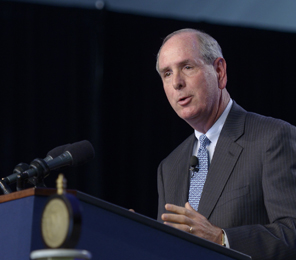
Chancellor Michael F. Collins met with key Massachusetts lawmakers in Washington, D.C., last week.
Chancellor Michael F. Collins met with key Massachusetts lawmakers in Washington, D.C., last week to draw greater attention to the dire threat posed to biomedicine by the fast-approaching “fiscal cliff.”
The chancellor met with U.S. Sen. John Kerry, and U.S. Reps. James McGovern, Edward Markey and Richard Neal. Each of these lawmakers is extremely supportive of UMass Medical School and stands out as a nationally recognized champion of biomedical research funding.
If Congress cannot reach an agreement on the budget deficit, mandatory budget cuts will be triggered that include an estimated 8.2 percent reduction in U.S. biomedical research funding. That would equal a $3.9 billion cut in the overall 2013 budget year, with $2.5 billion coming directly from the National Institutes of Health (NIH). While it is not clear how every state would be impacted, it is estimated that Massachusetts-based researchers could lose just over $200 million in funding next year alone.
The primary purpose of Chancellor Collins’ visit to Washington was to advocate for continued federal investment in medical research, especially for NIH, and in health-care-related professional education. Collins shared insights and information on the health improvements and economic growth such funding supports. He also detailed the grave economic impact the across-the-board cuts would have on this vital segment of the U.S. economy.
Francis Collins, the NIH’s director, has estimated the cuts would result in 2,300 fewer research grants in the 2013 budget year. That equals almost one-quarter of all new grants or those up for renewal. This would result in the lowest rate of grant funding in the agency’s history and would have a particularly profound impact on young investigators, he said.
Research funding has already been reduced, and experts fear that the looming drastic cuts will further hamper economic growth and threaten the country’s position as the world’s leader in this field.
In June, Craig C. Mello, PhD, Howard Hughes Medical Institute Investigator, Blais University Chair in Molecular Medicine and distinguished professor of molecular medicine and cell biology, travelled to D.C. and briefed the Congressional Biomedical Research Caucus. The bipartisan group, which comprises 83 congressional members, informs and educates Congress on the benefits of biomedical research.
Further calling attention to this critical issue, an editorial by Collins appeared in the Worcester Telegram & Gazette last week, detailing dangers posed by the pending budget cuts. “Scientific progress requires decades to proceed from discovery to clinical utility, and any disruption of basic research funding will have a ripple effect far into the future,” he warned.